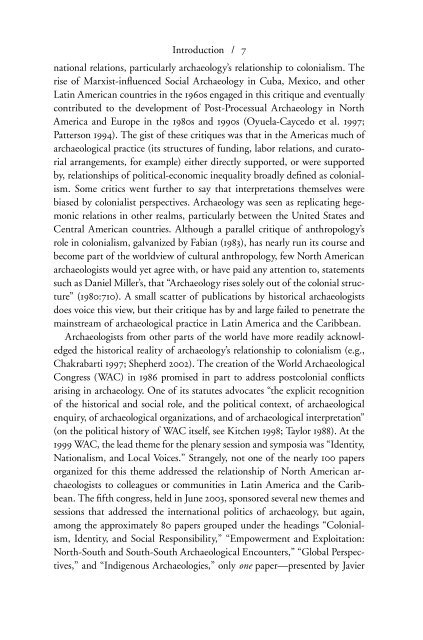Dialogues in Cuban Archaeology
by L. Antonio Curet, Shannon Lee Dawdy, and Gabino La Rosa Corzo
by L. Antonio Curet, Shannon Lee Dawdy, and Gabino La Rosa Corzo
Create successful ePaper yourself
Turn your PDF publications into a flip-book with our unique Google optimized e-Paper software.
Introduction / 7<br />
national relations, particularly archaeology’s relationship to colonialism. The<br />
rise of Marxist-<strong>in</strong>®uenced Social <strong>Archaeology</strong> <strong>in</strong> Cuba, Mexico, and other<br />
Lat<strong>in</strong> American countries <strong>in</strong> the 1960s engaged <strong>in</strong> this critique and eventually<br />
contributed to the development of Post-Processual <strong>Archaeology</strong> <strong>in</strong> North<br />
America and Europe <strong>in</strong> the 1980s and 1990s (Oyuela-Caycedo et al. 1997;<br />
Patterson 1994). The gist of these critiques was that <strong>in</strong> the Americas much of<br />
archaeological practice (its structures of fund<strong>in</strong>g, labor relations, and curatorial<br />
arrangements, for example) either directly supported, or were supported<br />
by, relationships of political-economic <strong>in</strong>equality broadly de¤ned as colonialism.<br />
Some critics went further to say that <strong>in</strong>terpretations themselves were<br />
biased by colonialist perspectives. <strong>Archaeology</strong> was seen as replicat<strong>in</strong>g hegemonic<br />
relations <strong>in</strong> other realms, particularly between the United States and<br />
Central American countries. Although a parallel critique of anthropology’s<br />
role <strong>in</strong> colonialism, galvanized by Fabian (1983), has nearly run its course and<br />
become part of the worldview of cultural anthropology, few North American<br />
archaeologists would yet agree with, or have paid any attention to, statements<br />
such as Daniel Miller’s, that “<strong>Archaeology</strong> rises solely out of the colonial structure”<br />
(1980:710). A small scatter of publications by historical archaeologists<br />
does voice this view, but their critique has by and large failed to penetrate the<br />
ma<strong>in</strong>stream of archaeological practice <strong>in</strong> Lat<strong>in</strong> America and the Caribbean.<br />
Archaeologists from other parts of the world have more readily acknowledged<br />
the historical reality of archaeology’s relationship to colonialism (e.g.,<br />
Chakrabarti 1997; Shepherd 2002). The creation of the World Archaeological<br />
Congress (WAC) <strong>in</strong> 1986 promised <strong>in</strong> part to address postcolonial con®icts<br />
aris<strong>in</strong>g <strong>in</strong> archaeology. One of its statutes advocates “the explicit recognition<br />
of the historical and social role, and the political context, of archaeological<br />
enquiry, of archaeological organizations, and of archaeological <strong>in</strong>terpretation”<br />
(on the political history of WAC itself, see Kitchen 1998; Taylor 1988). At the<br />
1999 WAC, the lead theme for the plenary session and symposia was “Identity,<br />
Nationalism, and Local Voices.” Strangely, not one of the nearly 100 papers<br />
organized for this theme addressed the relationship of North American archaeologists<br />
to colleagues or communities <strong>in</strong> Lat<strong>in</strong> America and the Caribbean.<br />
The ¤fth congress, held <strong>in</strong> June 2003, sponsored several new themes and<br />
sessions that addressed the <strong>in</strong>ternational politics of archaeology, but aga<strong>in</strong>,<br />
among the approximately 80 papers grouped under the head<strong>in</strong>gs “Colonialism,<br />
Identity, and Social Responsibility,” “Empowerment and Exploitation:<br />
North-South and South-South Archaeological Encounters,” “Global Perspectives,”<br />
and “Indigenous Archaeologies,” only one paper—presented by Javier


















